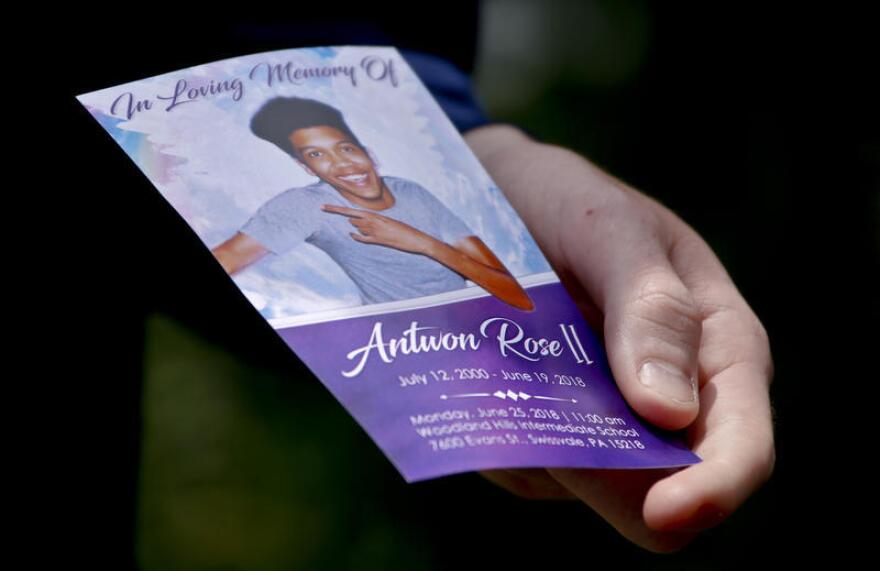Former East Pittsburgh police officer Michael Rosfeld goes on trial Tuesday for fatally shooting 17-year-old Antwon Rose last summer.
https://www.youtube.com/watch?v=-Up996TRzdU
The white officer shot and killed Rose as the black teen ran from a car the officer had pulled around 9 p.m. on June 19. The vehicle had been involved in a drive-by shooting 13 minutes earlier.
Rose, however, was unarmed, and just last week, another passenger in the car, 18-year-old Zaijuan Hester, pleaded guilty to firing in the drive-by.
Someone in a nearby house filmed the officer shooting at Rose, posting the video on Facebook hours later.
“And so this time, before the police could create a narrative that would justify the shooting of Antwon, we saw the video; we saw him running away,” local activist Jasiri X said.
Rose’s death sparked weeks of protests that shut down major roadways in and around Pittsburgh. For the demonstrators and others, Rose’s death fit a national pattern of police brutality against black residents.
Allegheny County District Attorney Stephen Zappala charged Michael Rosfeld with homicide the week after the shooting.
“You do not shoot somebody in the back if they are not a threat to you,” Zappala said.
The DA said Rosfeld did not face a threat of death or serious bodily injury when Rose ran away from him, and added that after the shooting, the officer gave conflicting accounts of whether he thought Rose was armed.

But Rosfeld’s attorney, Patrick Thomassey, contends that the fact that Rose was in a car involved in a drive-by shooting should be taken into account.
“This car was involved in an attempted murder – that’s why it’s being stopped. It’s not being stopped for going through a stop sign,” the lawyer said after a hearing in September. “People in that car, whoever, just tried to killed somebody.”
Thomassey later argued that the jury should hear that Rose had a gun magazine in his pocket when he was killed. The lawyer said that evidence is crucial to showing the car the teen was in was part of a felony in progress.
But the government countered that such information is not relevant, arguing that Rosfeld could not have known Rose was carrying the magazine when he fired his weapon.
At a January hearing, presiding judge Alexander Bicket said he would decide whether to allow the evidence when the trial begins.

Pittsburgh civil rights attorney Tim O’Brien said the jury will need to decide whether the officer could have reasonably seen Rose as a threat.
Noting that the law gives police the benefit of the doubt, O’Brien said Rosfeld’s lawyer will argue a number of factors, including “that the officer’s ability to observe wasn’t as clear because it was dark, because of where he was standing, that he misinterpreted something that he saw, and that it was a mistake.”
Moreover, Rosfeld’s case revealed that East Pittsburgh had no policy on when to use deadly force. In June, Zappala criticized the borough’s now-defunct police department for apparently having no policies in substantive areas.
University of Pittsburgh law professor and 90.5 WESA legal analyst David Harris predicted that this fact, however, will likely be part of Rosfeld's defense.
“‘I was trained this way. I did what I was trained to do. I did not go outside the training,’” Harris said. “That’s what his contention will be.”
Activist Jasiri X said, no matter what the defense argues, he hopes the video of the shooting will convince jurors.

“Video of a young man running away unarmed, being shot three times in the back – it should be open and close,” Jasiri X said, “and the fact that it’s not is super problematic.”
The shooting generated so much publicity that the judge worried a local jury would deny Rosfeld a fair hearing. Jurors will come from Harrisburg instead.
Since they must travel about 200 miles to Pittsburgh, the trial will run through the week and into the weekend if necessary.
Pittsburgh officials will take extra security measures around the courthouse, and said they’re prepared for possible unrest, depending on what the verdict is.




